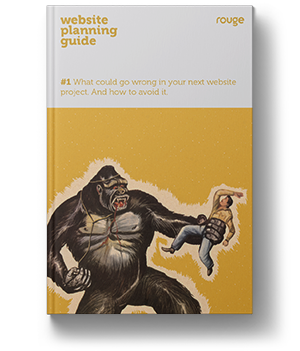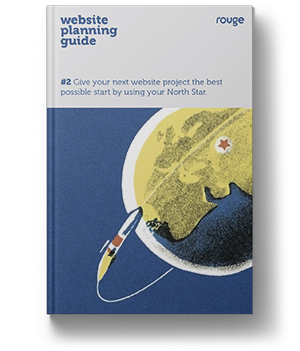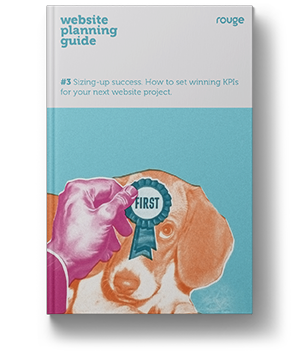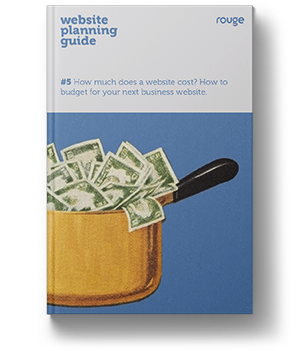7th September 2020
Our clients come to us with a full range of website project experience. Some are seasoned digital marketing professionals. Some are first-time website project managers. No matter what experience you might have, it’s certainly not your full-time job to know everything there is to know about creating websites. That’s what your agency is for right?
However, no matter how good your agency is, you are undoubtedly going to feel that the success of your business website lies heavily on your shoulders. You are definitely going to have to deal with topics, tasks and technology that are not in your everyday comfort zone. And it is just that feeling, that has inspired us to put this comprehensive website planning guide together – a collection of tales, tips, templates and tricks to help you to make your next website project a success.
Website Planning Guide – Index:
- #1 What could go wrong in your next website project? And how to avoid it.
- #2 Give your next website project the best possible start by using your North Star.
- #3 Sizing-up success. How to set winning KPIs for your next website project.
- #4 Deciphering techy website acronyms and jargon for your next project.
- #5 How much does a website cost? How to budget for your next business website.
- #6 How to brief a website agency (with free website brief template).
- #7 How to plan the content for your next business website.
- #8 Understand your customers, work out what they want, and build it for them.
- #9 How to technically review your website (before replacing it).
- #10 The 10 essential brand tools that will ensure the success of your next website.
- #11 How to brief a website copywriter.
- #12 Automate your marketing and plan a website with built-in customer engagement.
- #13 What content management system (CMS) should your new website use?
- #14 How project management can make your next website project easier than the last one.
- #15 The art of progressive enhancement. Make this the last website project you ever do.
- #16 The critical questions to ask your agency before starting your next website project.
#1 – What could go wrong in your next website project? And how to avoid it.
Having an experienced agency drive your website project will help avoid many of the usual pitfalls, but here are some of the things we see going wrong client-side: These are the challenges you don’t know you don’t know about creating your next website, and how to overcome them.
Creating a new website for any business or organisation is no simple task, and there is a lot that could go wrong. Being aware of any potential risks before you start is going to help you mitigate against them with your website agency. Over the years we have collected hundreds of these problems, and bit by bit we have engineered them out of the system. This article touches on some of the classics. Avoid these, and give your next website project the best possible chance of success.
READ IT: What could go wrong in your next website project. And how to avoid it.
#2 – How to target your next website’s North Star and give your project the best possible start.
In this article, we set out some simple steps you can take to discover, shape and use your organisation’s North Star Metric to take the first and most important step towards success and your next website.
You are probably familiar with the business term North Star Metric (NSM). It is a term that emerged from Silicon Valley and was created to give fast-growth companies a single metric with which to guide and measure all business decisions. It states the direction of travel so that the various working parts of the business have a singular focus – and this is how to do it for your website…
READ IT: How to target your next website’s North Star and give your project the best possible start.
#3 – Sizing up success – how to set winning KPIs for your next website project.
Choosing good website key performance indicators (KPIs) is an important part of measuring your business website’s success. Knowing why you are creating a new website and what success looks like may be obvious at first, but knowing how to measure performance and how to progressively improve the results can only be done with good KPIs from the start.
KPIs will be different for different organisations and sectors. An e-commerce website will have different KPIs to a charity website. Whatever the sector, all KPIs should align with the organisation’s overall objectives and targets, and should be measurable and actionable. That means avoiding fluffy KPIs like ‘building brand awareness’ and vanity metrics like ‘total visitor numbers’. You should be focusing on engagement, conversions and sales.
READ IT: Sizing up success – how to set winning KPIs for your next website project.
#4 – Deciphering techy website acronyms and jargon for your next project.
The marketing, digital design and web development worlds are full of jargon that some agencies like to have as their first language. A good agency project manager should always speak to you in plain English. In this article, we’ll be revisiting our handy website jargon-buster, and challenging you to add to our list.
READ IT: Deciphering techy website acronyms and jargon for your next project.
#5 – How much does a website cost? How to budget for your next business website.
Website prices can vary wildly from free, to millions of pounds. The range and variation of production, functionality, design and performance are pretty darn incredible. But it all really depends on what you need your website to do for your organisation. This article focuses itself somewhere in the middle of this range and takes a typical B2B website as its muse. It’s not too big, not too small. It is connected to business data in some way. And, its main aim is to generate leads and enquiries for the business. Read on to discover a hatful of tips, tricks and methods for pricing up your next website project, and… how to get the most value for your budget.
READ IT: How much does a website cost? How to budget for your next business website.
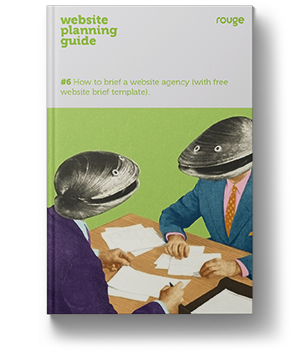
#6 – How to brief a website agency (with free website brief template).
Writing a website brief is not something most people do regularly. A website is made up of many aspects: creative design, brand messaging, accessibility, functionality, connectivity, budget. The list goes on. So, it is not surprising that many marketing professionals have a reason to pause before creating a brief. And, if that’s you, fear not. This article walks you through how to create the perfect preliminary brief for your next project. This is the information you need to get down, before approaching or looking for the perfect agency to design and build it for you.
READ IT: How to brief a website agency (with free website brief template).
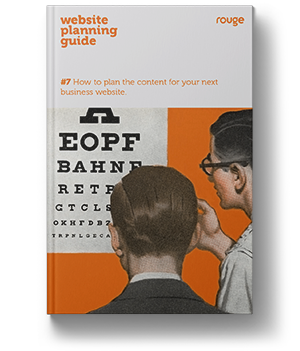
#7 – How to plan the content for your next business website.
A good website agency will be able to do a lot of the heavy lifting on your business website project, But the content can be an area where much more of the effort is on your plate. If you have the budget and the project time, check out our guide on how to brief a website copywriter – #11 in this series. If not then read on and we’ll share with you some methods and techniques and tasks that you can do now – to plan ahead for your website content writing and make your next project that little bit easier.
READ IT: How to plan the content for your next business website.
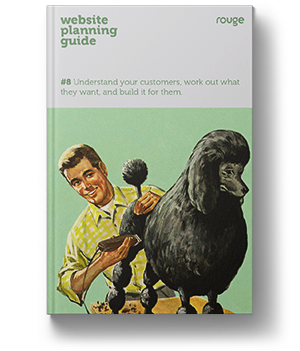
#8 – Understand your customers, work out what they want, and build it for them.
John Wannamaker, one of America’s advertising pioneers, is quoted as saying “When a customer enters my store, forget me. He is king.” Well, this attitude is as true for early 20th-century American department stores as it is for website design today. The customer goes first. And yet, it is something so many organisations seem to get wrong. They build websites for the business when they should be building them for the customer. This article will talk you through various methods and steps that will help you better understand your audience, develop an accurate sense of what your customers want from your website, and then lead you into how to deliver it.
READ IT: Understand your customers, work out what they want, and build it for them.
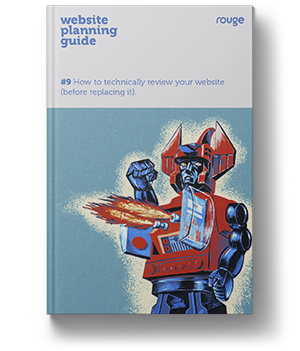
#9 – How to technically review your website (before replacing it).
Before you replace anything, you have to understand the website technical requirements and dependencies. Ignore at your peril critical business integrations, technology platforms, tools and systems that may have been set up – often behind the scenes – that must be considered as part of your new website launch. Website technical reviews are one of the main pillars of the website briefing and Discovery Phase. This article will get you thinking early about what could be lurking behind the scenes, and who you may need to talk to about it, within your organisation.
READ IT: How to technically review your website (before replacing it)
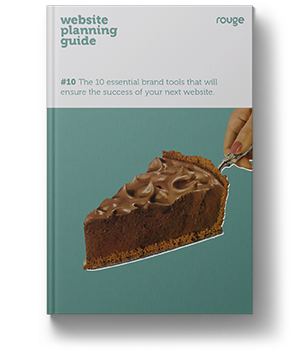
#10 – The 10 essential brand tools that will ensure the success of your next website.
Your business website is the key brand bridge between you and your customers.
“Your brand is what other people say about you when you’re not in the room.” – Jeff Bezos
So, if your customers, prospects, and competitors are going to talk about you behind your back then you sure as heck better make sure they know what your brand stands for. Because, if you don’t control it, they will make it up for you and you’ll lose the bridge. This guide will introduce you to the 10 essential brand tools you need to have if you are serious about having a successful website. Or for that matter, a serious brand.
READ IT: The 10 essential brand tools that will ensure the success of your next website.
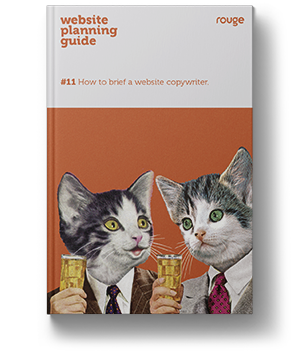
#11 – How to brief a website copywriter.
To deliver top-drawer, engaging and sales-focused copy, a copywriter needs to know as much as possible about your business, products and your audience. But it’s more than that. The tone of voice, or character, that speaks to your audience and makes the copy ‘pop’ should be in sync with your brand and other communication channels. And, of course, not forgetting, writing the content so that Google likes it and ranks you. This article explores how to hire the right copywriter for your next website project. How to get them on board and write content to represent your business, fit in with your website agency and make a significant difference to the success of your project.
READ IT: How to brief a website copywriter.
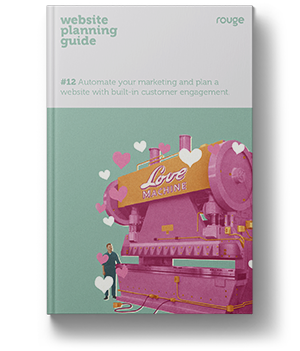
#12 – Automate your marketing and plan a website with built-in customer engagement.
If you are serious about having a website that actually works for your business, rather than just sitting there, passively waiting for customers to engage, then you should consider integrating a marketing CRM (customer relationship management) system. For example, HubSpot, Marketo, Pardot. There are no shortage of good research and comparison articles out there for CRMs. We’ll include some links to these. But, this article is more focused on how you could be working with your agency to build the ability for automated and content marketing into your website from the outset. We’ll look at the benefits of using a CRM for your sales and marketing, some of the main features, and have a look at what the future holds when artificial intelligence starts to drive business intelligence.
READ IT: Automate your marketing and plan a website with built-in customer engagement.
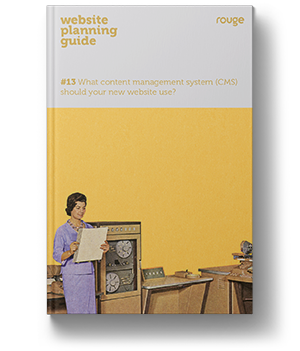
#13 – What content management system (CMS) should your new website use?
There is no right answer to ‘what is the best CMS?’ There are many platforms to choose from but here are some of the most important factors: Easy to use – The success of the website as a sales and marketing tool depends on the site being accessible and flexible. Security – No website CMS is so secure that it can’t be hacked, but the risk of intrusions can be significantly reduced. Flexible – A good CMS will allow you to progressively enhance your website without huge cost or worse, a rebuild. This article explores the world of the website Content Management System – and how to make sure your next website is built upon the right one.
READ IT: What content management system (CMS) should your new website use?

#14 – How project management can make your next website project easier than the last one.
Building or refreshing a website is the perfect opportunity to kick-off a partnership with a new agency. Getting a team on board that has years of experience to hand will ensure that your project is delivered on time and on budget. Pulling together the right people (ones who are able to communicate effectively and work well with your brand) will help keep your project on the rails. They might even be able to make it a memorable and enjoyable experience. Yes, it’s possible!
READ IT: How project management can make your next website project easier than the last one.

#15 – The art of progressive enhancement. Make this the last website project you ever do.
Okay, perhaps that is a bit optimistic but almost all websites suffer a decline in relevance and effectiveness from the day they are launched, albeit subtly first. In this article, we’ll discuss the approach we like to call “continual improvement and progressive enhancement”. It is the art of keeping a website fresh, relevant, secure, and everything it needs to be for your organisation – by having a close relationship with your digital agency and a clear plan of attack from the outset.
READ IT: The art of progressive enhancement. Make this the last website project you ever do.
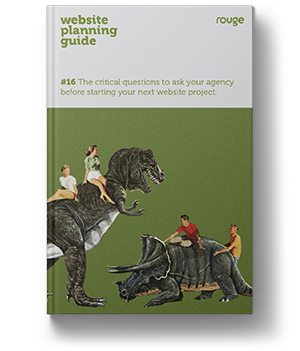
#16 – The critical questions to ask your agency before starting your next website project.
You’ve shortlisted some agencies to pitch for your website project. The portfolios look great, the testimonials are inspiring, and they have all worked in your industry sector before. But how do you know if the client-agency relationship will work? Well, what better way to find out than from your peers. In this article, we have interviewed some preeminent marketing managers and asked them to share with us the questions that they will always ask their agency before the start of their next website project.
READ IT: Coming soon
Website planning with Rouge.
We hope you have found our comprehensive website planning guide useful – so far. If you are interested in getting an alert as we publish each new article, or you have any questions, please do get in touch.
And remember, despite all our excellent advice in these articles, there is no substitute for having an experienced website design agency by your side to guide you to digital marketing success.

